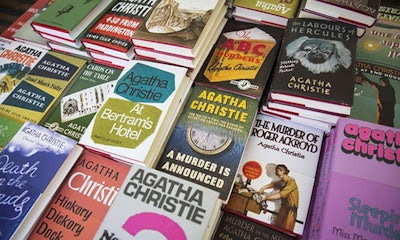Features
William Shakespeare’s Influence on Christie’s Works

Written by Christie expert Chris Chan
Agatha Christie was a lifelong Shakespeare fan who enjoyed reading and watching his work as well as carefully referencing it in some of her own stories.
In An Autobiography, Agatha Christie reflects on the pleasure of seeing Shakespeare performed:
There is no greater mistake in life than seeing things or hearing them at the wrong time. Shakespeare is ruined for most people by having been made to learn it at school; you should see Shakespeare as it was written to be seen, played on the stage. There you can appreciate it quite young, long before you take in the beauty of the words and of the poetry.
She recalls fond memories of taking her grandson Mathew to see Macbeth and The Merry Wives of Windsor at the theatre when he was eleven.
In The Pale Horse, Christie writes about how portrayals of the three Witches in Macbeth are overdone, and the character states that if she were directing the roles, they would just be three quiet little old ladies, talking softly but slyly. It might be suggested that the Bradbury-Scott sisters in Nemesis are the embodiment of this idea, along with the self-proclaimed witches in The Pale Horse.
Shakespeare’s works have inspired thousands of writers, and Agatha Christie is no different. In fact, Shakespeare is the writer most quoted in Christie’s stories. Here is a selection of Shakespeare references which appear in Agatha Christie’s stories.
Titles
A few of Christie’s book titles were taken from Shakespeare’s works including Absent in the Spring which she wrote under the pseudonym Mary Westmacott. The novel gets its name from Shakespeare’s Sonnet 98 which begins, "From you I have been absent in the Spring."
The title of Taken at the Flood is from a speech in Shakespeare’s Julius Caesar which begins, "There is a tide in the affairs of men, which, taken at the flood, leads on to fortune." The full speech is also used as the epigraph at the start of the book.
In addition, the title for Sad Cypress was derived from a song in Shakespeare’s play Twelfth Night and the title of the Tommy and Tuppence Novel, By the Pricking of my Thumbs, is from Act 4 of Shakespeare’s Macbeth.
Themes
References to Shakespeare's works go beyond book titles and are often included as quotes in stories. For example, on discovery of a body in Hercule Poirot's Christmas, one of the suspects says, 'Who would have thought the old man to have had so much blood in him?' which is a quote taken from Macbeth.
Romeo and Juliet is a recurring theme in Five Little Pigs and one of the characters, Elsa Greer, even suggests that she ought to have put a ‘knife in herself, like Juliet,’ after her lover passed away.
In Poirot's summation of the crime in The ABC Murders he misquotes a line saying "You cannot see the trees for the wood" and attributes it to Shakespeare. Appointment with Death also ends with a nod to Shakespeare’s Cymbeline.
Have you noticed any other Shakespearian references in Agatha Christie’s works? Share them with us on Twitter.



 USA
USA 